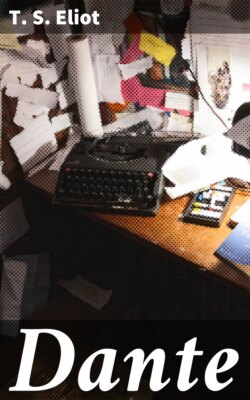Читать книгу Dante - T. S. Eliot - Страница 3
На сайте Литреса книга снята с продажи.
PREFACE
ОглавлениеTable of Contents
IF my task had been to produce another brief ‘introduction to the study of Dante’ I should have been incompetent to perform it. But in a series of essays of ‘Poets on Poets’ the undertaking, as I understand it, is quite a different one. A contemporary writer of verse, in writing a pamphlet of this description, is required only to give a faithful account of his acquaintance with the poet of whom he writes. This, and no more, I can do; and this is the only way in which I can treat an author of whom so much has been written, that can make any pretence to novelty. I have found no other poet than Dante to whom I could apply continually, for many purposes, and with much profit, during a familiarity of twenty years. I am not a Dante scholar; my Italian is chiefly self-taught, and learnt primarily in order to read Dante; I need still to make constant reference to translations. Yet it has occurred to me that by relating the process of my own gradual and still very imperfect knowledge of Dante, I might give some help to persons who must begin where I began—with a public school knowledge of Latin, a traveller’s smattering of Italian, and a literal translation beside the text. For this reason my order, in the following chapters, is the order of my own initiation. I begin with detail, and approach the general scheme. I began myself with passages of the Inferno which I could understand, passed on to the Purgatorio in the same way, and only after years of experience began to appreciate the Paradiso; from which I reverted to the other parts of the poem and slowly realized the unity of the whole. I believe that it is quite natural and right to tackle the Vita Nuova afterwards. For an English reader who reads the Vita Nuova too soon is in danger of reading it under Pre-Raphaelite influence.
My purpose has been to persuade the reader first of the importance of Dante as a master—I may even say, the master—for a poet writing to-day in any language. And there ensues from that, the importance of Dante to anyone who would appreciate modern poetry, in any language. I should not trust the opinion of anyone who pretended to judge modern verse without knowing Homer, Dante, and Shakespeare. It does not in the least follow that a poet is negligible because he does not know these three.
Having thus excused this book, I do not feel called upon to give any bibliography. Anyone can easily discover more Dante bibliography than anyone can use. But I should like to mention one book which has been of use to me: the Dante of Professor Charles Grandgent of Harvard. I owe something to an essay by Mr. Ezra Pound in his Spirit of Romance, but more to his table-talk; and I owe something to Mr. Santayana’s essay in Three Philosophical Poets. And one should at least glance at the Readings of W. W. Vernon in order to see how far into mediaeval philosophy, theology, science, and literature a thorough study of Dante must go.
The reader whom I have kept in mind, in writing this essay, is the reader who commences his reading of Dante with Messrs. Dent’s invaluable Temple Classics edition (3 volumes at 2s. each). For this reason I have in quotations followed the Temple Classics edition text, and have followed pretty closely the translation in the same volumes. It is hardly necessary to say that where my version varies it nowhere pretends to greater accuracy than that excellent translation. Anyone who reads my essay before attempting Dante at all will be likely to turn next to the Temple Classics edition, with its text and translation on opposite pages. There is something to be said for Longfellow’s, and something for Norton’s translation; but for anyone who can follow the Italian even gropingly the Temple translation is the best.
